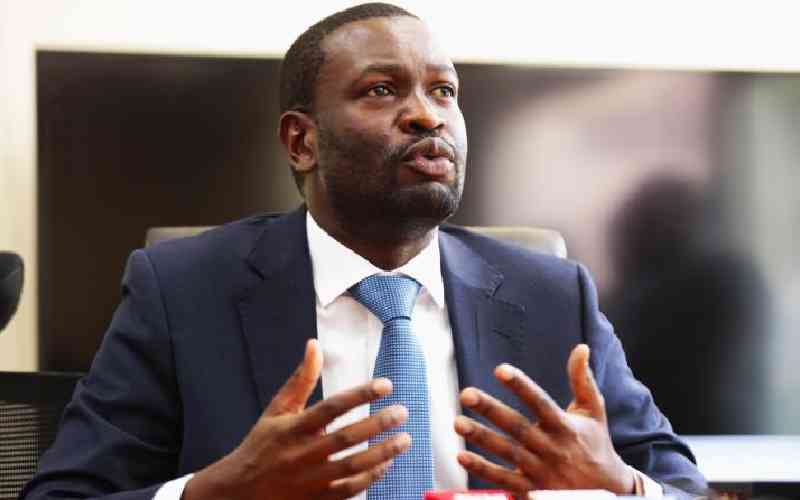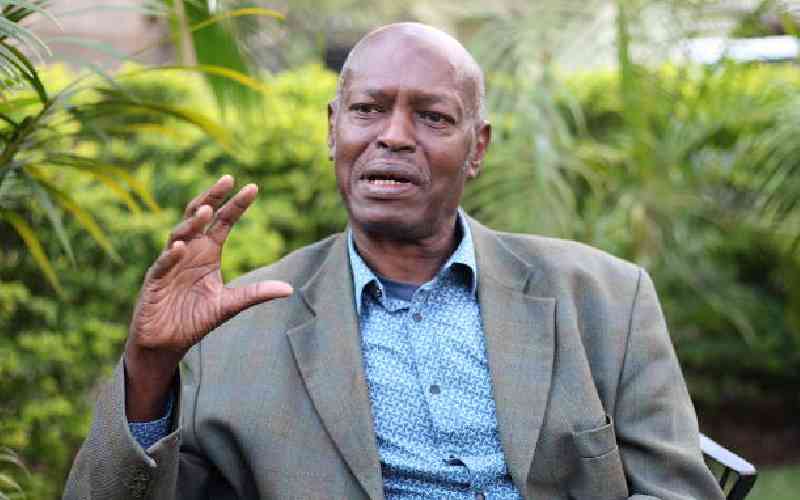Obar Mark
“Gideon Moi is uncircumcised, says DP Ruto,” that is today’s main headline in one of the local dailies. My first reaction after reading it was, “how did he know that Gideon Moi is not circumcised? I thought such assessments are left for women to carry out and make a report to no one in particular.” Maybe, and just maybe, someone must have told Deputy President William Ruto that his clansman has not gone through the cut, but the “politics of private parts” is not anything new in Kenya.
You may be wondering why circumcision is so much important in Kenyan politics. Firstly, of all the 42 communities in Kenya, only 26% practice circumcision as part of their culture. The communities that practice circumcision are actually the biggest, making up to over 40% of the entire national population. In particular, circumcision is a rite of passage – that ushers in a boy into adulthood. Thus, there is a perception that those who are not circumcised are still boys even when they are 100 years old.
It’s medically proven that circumcision may reduce chances of contracting sexually transmitted diseases, and as such men are encouraged to attend to it as a vital medical practice. Survey shows that a number of men from the communities such as Luo that never practiced this culture have started performing it so as stay safe either medically and politically.
In Kenya, when politicians run out of serious ideas on how to spin rhetoric, they resort to such droll cultural aspects like circumcision. Politicians understand so well the cultural attachments that communities have with circumcision, and it’s no doubt that they must exploit every bit of it.
Attack on fellow leaders on whether they are circumcised or not is enough proof that sometimes our politics may go overboard with little substance between ears. Last year, unapologetic Governor Kabogo was questioned by the Criminal Investigation Department for allegedly insinuating that some communities don’t deserve producing national leaders because they are not circumcised. Before visiting the DCI, Kabogo is reported to have repeated the comments he was summoned for, saying Kenyans have a right to make citizen arrests.
It’s relatively scandalous how a fellow man is so much interested in another man’s private part such that he has to climb on the podium to announce that other men do not have the “right kind of private parts.” The daily quoted DP Ruto saying, “Kalenjins stood by him shoulder-to-shoulder, until he became President, so this uncircumcised son of Arap Moi should not bring us his stupidity by telling us that we cannot support other Kalenjin leaders from other families . . . tell them to leave us, to stop playing with us.” It should be understood that we haven’t independently verified this report, and as such should be treated overtly as an allegation.
As a religious rite, circumcision was required of all of Abraham’s descendants as a sign of the covenant God made with him (Genesis 17:9–14; Acts 7:8). The Mosaic Law repeated the requirement (Leviticus 12:2–3), and Jews throughout the centuries have continued to practice circumcision (Joshua 5:2–3; Luke 1:59; Acts 16:3; Philippians 3:5).
There are different issues involved in the question of whether or not males today should be circumcised. Concerning the first issue, New Testament Christians are no longer under the Old Testament Law, and circumcision is no longer required. This is brought out in a number of New Testament passages, among which are Acts 15; Luke 1:59; Acts 16:3; Philippians 3:5). Even the Law acknowledged that circumcision alone was insufficient to please God, who specified the need to “circumcise your hearts” (Deuteronomy 10:16; cf. Romans 2:29).
There are practical issues involved with circumcision as well. Some parents have their sons circumcised so that they will look like all the other males in their culture. Some parents are concerned that their son would someday be in a locker room and find himself different from everyone else. In some cultures, though, males are not commonly circumcised.
If you got a chance to study abroad, you (man) should have mingled enough with white people, especially ladies so as to gain serious relationships or just for leisure, pleasure and experience. Probably you are aware that white females despise circumcised African men – claiming that circumcision makes them insensitive during sexual practices. Of course, this myth is based on some unfounded research that claims that circumcision makes men less interested in sex and reduced their pleasure during sex.
Back home in Kenya, politicians have made us to believe that uncircumcised men are children with immature brains that cannot make serious decisions, and therefore should not be leaders. This is just another myth which politicians exploit to stay relevant as well as to peddle hate among communities. Interestingly in Kenya, statistics reveal that the highest number of professors, doctors and engineers come from those communities that don’t practice circumcision.
Gideon Moi and William Ruto are serious leaders who we all respect owing to the many sacrifices that they have offered this country. Turning to pages of political brouhaha, there are concerns that Gideon and Governor Isaac Rutto are positioning themselves to tilt DP Ruto’s power and influence among the Kalenjin community. The politics in the Rift Valley as well as across the whole country is heating up, but our leaders should leave a room for sobriety and respect because the bottom line is, “circumcision has nothing to do with your brain or personality.”
Stay informed. Subscribe to our newsletter
 The Standard Group Plc is a
multi-media organization with investments in media platforms spanning newspaper
print operations, television, radio broadcasting, digital and online services. The
Standard Group is recognized as a leading multi-media house in Kenya with a key
influence in matters of national and international interest.
The Standard Group Plc is a
multi-media organization with investments in media platforms spanning newspaper
print operations, television, radio broadcasting, digital and online services. The
Standard Group is recognized as a leading multi-media house in Kenya with a key
influence in matters of national and international interest.
 The Standard Group Plc is a
multi-media organization with investments in media platforms spanning newspaper
print operations, television, radio broadcasting, digital and online services. The
Standard Group is recognized as a leading multi-media house in Kenya with a key
influence in matters of national and international interest.
The Standard Group Plc is a
multi-media organization with investments in media platforms spanning newspaper
print operations, television, radio broadcasting, digital and online services. The
Standard Group is recognized as a leading multi-media house in Kenya with a key
influence in matters of national and international interest.








